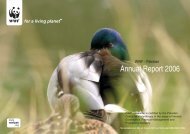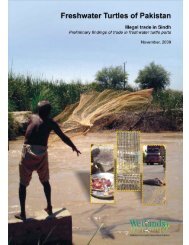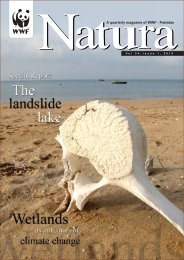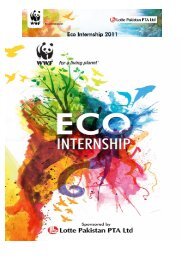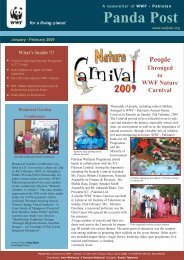Freshwater Turtles of Pakistan
Freshwater Turtles of Pakistan2-2007 - WWF-Pakistan
Freshwater Turtles of Pakistan2-2007 - WWF-Pakistan
Create successful ePaper yourself
Turn your PDF publications into a flip-book with our unique Google optimized e-Paper software.
q Population status and trend <strong>of</strong> freshwater turtles in <strong>Pakistan</strong>;<br />
q Impacts <strong>of</strong> water pollution on freshwater turtles in major rivers <strong>of</strong> <strong>Pakistan</strong>;<br />
q Monitoring <strong>of</strong> habitat change and its impacts on freshwater turtles;<br />
q Assessment <strong>of</strong> sites for the hatcheries and farming centers <strong>of</strong> freshwater turtles;<br />
q Ecological role <strong>of</strong> freshwater turtles <strong>of</strong> <strong>Pakistan</strong> or the biology <strong>of</strong> freshwater turtles <strong>of</strong><br />
<strong>Pakistan</strong>;<br />
q Identification <strong>of</strong> the nesting sites <strong>of</strong> freshwater turtles along the River Indus; and<br />
q Socio-economic status <strong>of</strong> local communities (Mohana and Kail/Pakhiwal) and its impacts<br />
on Indus River ecosystem.<br />
7.5 Social organisation and improved livelihood <strong>of</strong> local communities<br />
The local communities involved in capture and killing <strong>of</strong> freshwater turtles, live below poverty<br />
line. They consider it as an opportunity for livelihood. These communities traditionally make<br />
several items from Typha species, however, due to poor quality and no proper marketing <strong>of</strong><br />
their products; this is not a pr<strong>of</strong>itable pr<strong>of</strong>ession for them. Some people are willing to stop<br />
killing <strong>of</strong> turtles if any other livelihood opportunity is provided. Dependency on natural<br />
resources can be reduced by providing local communities with improved livelihood<br />
opportunities. In order to organise these communities, community based organisations<br />
(CBOs) should be established in collaboration with the provincial wildlife departments to<br />
protect freshwater turtles.<br />
7.6 Establish turtle hatcheries and protection <strong>of</strong> nesting sites<br />
Surveys should be conducted to identify suitable places for establishing hatcheries for<br />
freshwater turtles. Protection <strong>of</strong> nesting sites <strong>of</strong> turtles is necessary for their survival. Nest<br />
protection during breeding season can be promoted through CBOs.<br />
7.7 Trainings and capacity building<br />
The trainings should be organised for the government <strong>of</strong>ficials to build their capacity in<br />
captive care <strong>of</strong> turtles. The customs staff should be trained in recognising parts <strong>of</strong> turtles to<br />
stop the illegal export <strong>of</strong> turtle meat and parts.<br />
7.8 Market surveys<br />
Market surveys should be conducted and the extensive network <strong>of</strong> national and international<br />
dealers should be identified, in addition to market chains at local level.<br />
7.9 Protected areas for freshwater turtles<br />
The areas should be assessed for the presence and abundance <strong>of</strong> threatened freshwater<br />
turtles and designated as reserves or protected areas for freshwater turtles.<br />
Page 16 <strong>of</strong> 23 <strong>Freshwater</strong> Turtle Survey, 2007




